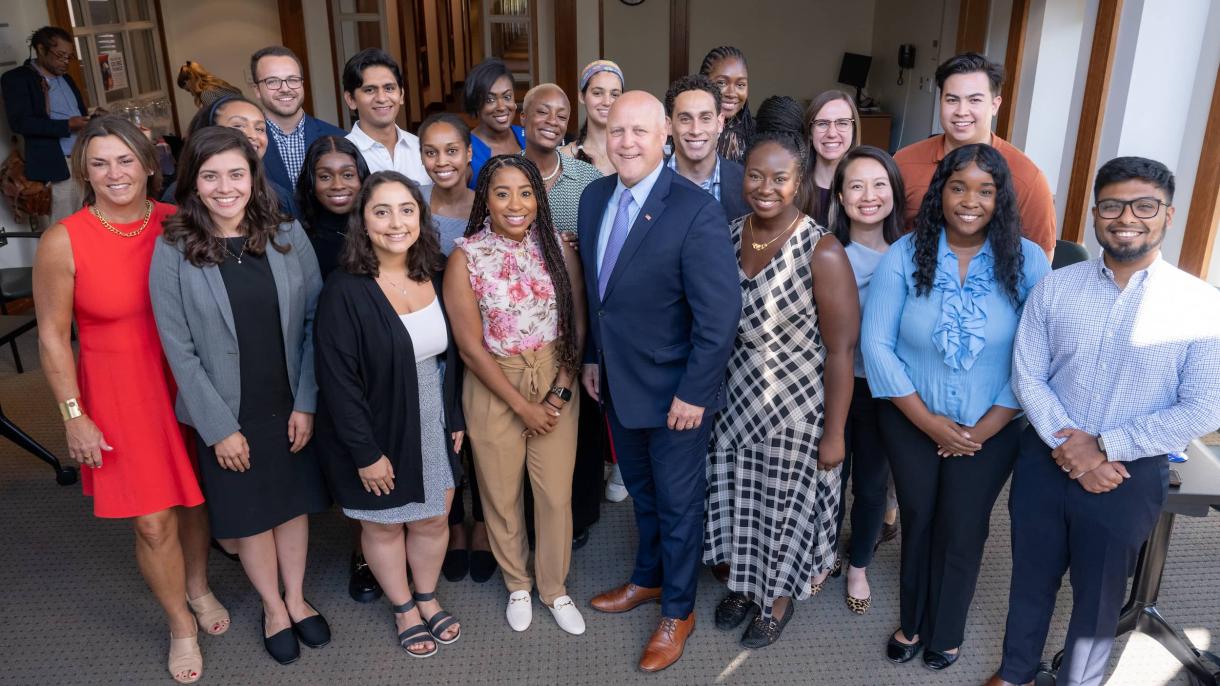
By Ana Phakhin MPP'24
On September 7, Sanford’s Policy in Living Color (PiLC) student organization held a student roundtable discussion with Rubenstein Lecture speaker Mitch Landrieu. Landrieu is known for his tenure as Mayor of New Orleans after Hurricane Katrina, and currently serves as the White House Senior Advisor for the Infrastructure Investment and Jobs Act.
The conversation ranged from passion for one’s community to the cyclical nature of the same issues being fought over and over again. Landrieu emphasized the importance of understanding first-hand the impact of policy implementation in people’s lives, especially in a closely connected community like New Orleans.

As someone who grew up in a small Southern community, I could identify with several of Landrieu’s points. Public policy development and implementation should be inclusive of the voices of people who are the most affected, yet they often have very little input in the policymaking process.
When I was working on community organizing in rural Arkansas, our focus was on strengthening grassroots leaders to advocate for their issues. From more equitable school funding to reforming juvenile justice policies, our community organizing work prioritized the redistribution of power, resources and leadership so the people who were most affected by policy decisions were at the table shaping the solutions. It meant working with the best of small communities to address some of the worst parts.
We partnered with young students, concerned parents, rural superintendents, teachers, legislators and many others. And it worked, mainly because we all got to know each other better, more trust and stronger relationships were built, and the people most affected by these issues were the ones driving the charge for change.
These memories came back to me, as I sat listening to the conversation between Landrieu and the future policymakers from Policy in Living Color.
Landrieu had just recently traveled from visiting Indigenous communities in Alaska and the additional guest speaker Caitlin Durkovich (PPS’94, Special Assistant to President Biden and Senior Director for Resilience and Response for the National Security Council) had just returned from Maui, which is recovering from destructive wildfires. Both were working on a broad portfolio of national policy issues addressing different challenges.
Building on his mayoral experiences, Landrieu stressed the importance of proximity and remaining connected to communities to ensure that policies developed on a national level don’t look vastly different when being implemented locally. He noted: “You don’t want to end up with a cow on the ground when you were trying to build a plane.” Policy implementation is just as important as policy development.
This was a salient reminder for Policy in Living Color students as future policymakers. It is particularly important for students from historically underserved communities to have these experiential opportunities to converse with policymakers on the issues impacting their own communities.

At Sanford, my own policy interests have sharpened to focus on early childhood policy, especially the intersection of climate and childcare. Along with other vulnerable populations, children will disproportionately bear the impact of climate-related challenges. These challenges are also detrimental to the systems and infrastructure that support children’s development and the communities around them.
When childcare centers are flooded and have to close down, or intense heat prevents learning in safe environments, it can be disruptive and harmful to all. These issues are especially challenging for childcare providers, many of whom are women of color. Strengthening childcare infrastructure is a critical component of building more sustainable and resilient communities.
As part of my interest in strengthening the early care ecosystem, I interned with the Equity and Economic Opportunity Practice team at The Rockefeller Foundation this past summer. I learned about creative community-based solutions to mobilize capital to historically underserved communities, especially for businesses owned by women of color. This experience allowed me a deeper understanding of being proximate to the communities most affected by these challenges and collaborating with others to leverage collective resources. Along with my time at Sanford, these experiences are a hopeful glimpse of the changes brewing across our country and the levers of opportunity that must continue to be built for people and communities to thrive.
Ana Phakhin is a second-year Master of Public Policy student at the Sanford School of Public Policy with a focus on early childhood and family economic policy. From advocating for public school funding to Medicaid expansion in Arkansas, her career started with rural community organizing and philanthropic initiatives for education equity. Ana most recently worked with The Rockefeller Foundation to mobilize access to capital for historically underserved communities and create more inclusive ecosystems for prosperity. She is a graduate of Wellesley College.
Policy in Living Color (PiLC) is a Sanford based student-organization that focuses on advancing the interests of communities of color. Learn more about Sanford's student organizations.
Featured Video